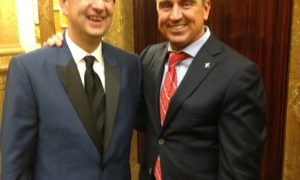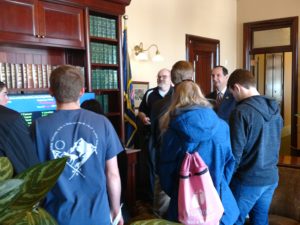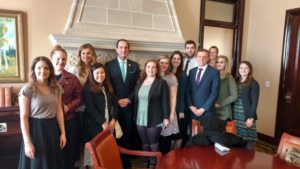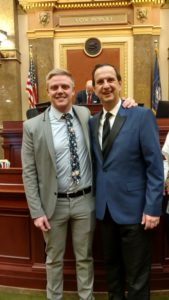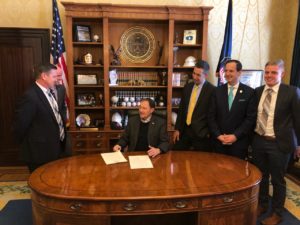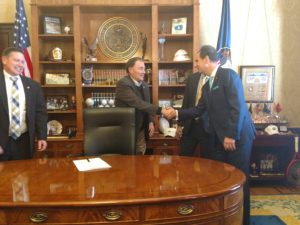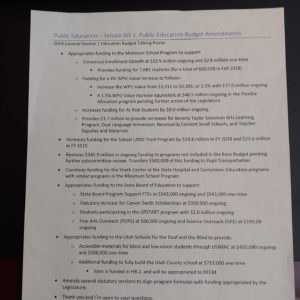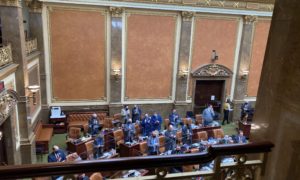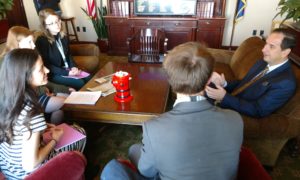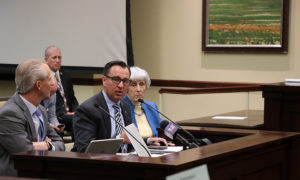Week 7 – As the clock struck midnight on Thursday, March 8, the session came to an end. As you can imagine, the final week was a full speed rush to the finish line in an attempt to deal with the highest priority proposals. Those that didn’t beat the clock will have to wait until next year.
Constituent News
Visitors to the Capitol
There weren’t a lot of visitors on the hill this week, but it was still great to meet with those that made the effort to come.
Provo High School Government
BYU Public Health Students
Behind the Scenes
During the final week, since we are essentially on the floor from start to finish every day, there aren’t as many groups on the hill. But that doesn’t mean there aren’t things happening.
Legislative Interns
Each session, legislators are assigned a university student as part of the official internship program. I couldn’t have asked for a better one! Casey Roper, a BYU student from Kamas, Utah got to be my sidekick and partner and we had a great session together. In addition to being the photographer behind many of the pictures you are seeing, Casey kept me on schedule, researched bills, help prepare presentations, handled constituent requests and inquiries, and generally kept me on track.
Casey Roper
Alternatives to Passing Bills
As I may have mentioned previously, sometimes the best outcome doesn’t involve passing a bill to change the law. Another example of that happened this year. Rep. Val Peterson proposed a bill to limit the amount of lobbying that executive branch employees could do while being paid by taxpayers. I agreed with his premise that the taxpayers shouldn’t be footing the bill to support state employees who come to the legislature to lobby for or against particular policy changes. However, instead of moving the bill forward, he was able to discuss with Governor Herbert an alternate approach, and the Governor and Lieutenant Governor Cox signed an executive order implementing similar restrictions. I was fortunate to be allowed to witness the signing along with Reps. Peterson and Roberts.
Gov. Herbert
Update on the State Central Committee Bylaw Change
While the House passed two bills to propose changes in election law that would have given some clarity to the current situation, the Senate chose to not hear either of them on the Senate Floor. Afterward, the State Republican Party officers issued a statement that they consider that the proposed bylaw change is “null and void” because it puts the party in conflict with state and federal law. Our governing documents specify that the State Central Committee cannot take an action that would cause the party to violate those laws.
So, where does that leave everything? While I think for the moment candidates can pursue the nomination under the rules in place at the time the party declared its intention to be a Qualified Political Party, I am also quite sure that this issue is not over and that one or more lawsuits are likely.
I have decided to seek the nomination through the caucus-convention process. However, after discussing with legislative attorneys and the state elections office, I also feel the need to protect myself against potential lawsuits challenging the QPP status of the party. To that end, I have registered to gather signatures, but I have no intention of using the signature path to get on the ballot unless the courts invalidate the caucus-convention path.
My Ideas in Action
Final Outcome of Canada Drug Importation
We made a lot of progress on this issue this year. The rising cost of prescription drugs is now solidly on many people’s radar and will be back next year. There will be serious work over the summer to investigate the possible benefit of both importation and transparency as possible solutions.
HB115 ADA Lawsuits
Unfortunately, the clock ran out before this bill could be considered by the full Senate. At one point in the evening, it was fourth on the list to be considered and would have made it, but 11 other bills were pushed to the top of the list, causing it to ultimately run out of time. I am disappointed that with such bipartisan support and the evident need that we were not able to get the job done, but we are well positioned for next year.
Big Issues
Taxes and Budgets
For the most part, I think the final budgets were fine. However, I am seriously disappointed that a significant increase in property taxes was pushed through on the last day. You will also have an opportunity to vote for or against another significant increase in the gas tax. As a matter of transparency, you will get to vote on whether to increase the gas tax from 29 cents a gallon to 39 cents a gallon (roughly a 33% increase). I opposed this tax increase and hope you will too. It is appalling to think that in a year with a $600 million surplus, we were not able to join the federal government in lowering your taxes, or at a minimum not raise them.
Education Funding
At the end of the session, we passed Senate Bill 2 which finalized the funding package for public K-12 education. I was able to get a picture of the sponsor’s talking points so you can see how things turned out.
My Bills – Status update
Final Report on Bills that I Sponsored
HB19 would create programs inside health insurance plans that reward members who shop for lower cost health care options by sharing some of the savings with them. Passed.
HB34 clarifies that employees may take paid leave to assist with natural disasters with any agency, not just the Red Cross. Passed.
HB36 sets out a process and limitations for cities and towns that want to regulate free speech on public grounds. It will help ensure citizens’ rights to free speech. Passed.
HB98 is a small fix to the DUI legislation from last year. It changes the definition of “novice driver” to exclude anyone over 21 who has a full drivers license. Passed.
HB115 relating to ADA abusive lawsuits (see above for report).
HB162 allows a person that buys a used car to keep the license plates and not have to buy new ones. Passed.
HB163 would set up a program to allow wholesalers to import lower cost drugs from Canada and make them available to Utah’s pharmacies. This bill was recommended for interim study and I fully expect that we will get Phase 1 done as planned.
